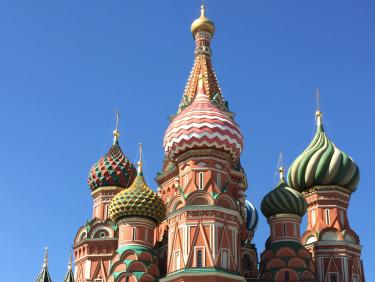Faculty of Modern Languages Eastern European and East Central European Studies
Students in the Eastern European and East-Central European Studies programme will be taught an interdisciplinary approach to the examination of the culture and history of the Slavic countries.
The Bachelor’s degree programme in Eastern European and East-Central European Studies is interdisciplinary in nature: It combines solid language training with fundamental knowledge and research skills in the areas of both Slavic philology (linguistics, literature, and cultural studies) and Eastern European history. The interdisciplinary nature of the degree programme permits a multi-faceted examination of Eastern Europe and East-Central Europe, enabling a differentiated understanding of both historical and current cultural and political developments. Students will obtain essential key competencies as well as sought-after expert knowledge of our increasingly globalised and interconnected world, particularly as regards the expanding relationship between Europe and the countries of Eastern, East-Central and Southern Europe.

Special Features and Characteristics
The Bachelor’s degree programme in Eastern European and East-Central European Studies is a collaboration between the Institute of Slavic Studies and the Chair for Eastern European History at the Heidelberg University Department of History. Its interdisciplinary nature enables students to engage in an examination of the culture of the Slavic countries from a wide variety of perspectives. While philological questions are at the focus of language and literature studies, historical studies will investigate the historical development of the individual Slavic countries in both a pan-European and an international context. The knowledge and academic skills students will acquire during their studies in the areas of history, language, and literature will coalesce to form a well-founded overall cultural perspective.
The interdisciplinary aspect of the degree programme is also enhanced by the opportunity for importing individual lectures, courses, and seminars related to Eastern Europe and East-Central Europe from other subject areas. Students may select courses from the broad course offerings at Heidelberg University as well as the neighbouring Heidelberg College for Jewish Studies, the Siebenbürgen Institute, and other academic institutions.
Research
Literary Studies focus
The expertise possessed by the Chairs as well as the instructors at the Institute of Slavic Studies ensures that students are receiving the broadest and most comprehensive picture possible of the diversity of Slavia. This includes a literary focus on authors of nineteenth-century classics, such as Pushkin, Gogol, Dostoevsky, and Tolstoy, as well as on avantgarde poetry and modern literature. Particular emphasis is placed on comparative approaches. Another important area of studies is the theory and practice of literary translation.
Linguistics research focus
Linguistic research topics include the study of language transformation in both recent and ancient history of the Slavic languages. This historical research does not begin with the emergence of the individual Slavic languages during the early Middle Ages, but goes further back to study what is referred to as “proto-Slavic”, which predates the written word.
In the study of modern Slavic languages, socio-linguistic issues (such as bilingualism and multilingualism, language varieties research, the language of the media prior to and following the political transformations of 1989), language contact research, and typology play especially important roles.
Eastern European History
Research at the Eastern European History Department at Heidelberg University is particularly concerned with the history of Russia, the Ukraine, and Poland in the nineteenth, twentieth, and twenty-first centuries. This includes aspects of social, economic and cultural history, a comparison of dictators, the history of violence, transitional justice research, environmental history, and the history of knowledge and science. Areas of research emphasis are currently divided into four areas:
- World War II and Holocaust history as well as the examination of crimes committed by the Third Reich in prosecuting criminals in Eastern Europe
- Stalinism, both from a cultural-historical perspective as well as in the context of the Soviet Union’s minority politics
- The history of Russian terrorism and its transnational ties
- The history of atomic incidents in the Soviet Union including the associated knowledge acquired
The professorship is also affiliated with research sites for the study of the history of Russian Germans as well as the ERC project, “Entangled Parliamentarisms: Constitutional Practices in Russia, Ukraine, China and Mongolia 1905–2005”.
Occupational Areas
With the broad range of skills that graduates of Humanities programmes acquire, they are attractive candidates for a wide variety of professional opportunities. The knowledge of language, history, and culture of the Slavic countries that students will have acquired during their studies makes them particularly well-qualified for positions in an intercultural professional environment, including careers in:
- Intercultural exchange (e.g. cultural institutions, foundations)
- The education sector (e.g. publishing houses, adult education)
- Research (especially if further academic credentials are obtained)
In particular, the inclusion of Eastern European countries in European institutions provides graduates of Slavic studies with an opportunity to serve as a societal bridge between Germany and its eastern neighbours in the areas of communications and collaboration.
Insights

I have always been interested in Russian literature and Eastern European history, which is why I decided to learn Polish and Russian. The academic programme is the perfect interdisciplinary combination of Slavic studies and Eastern European history.
Elena Weber, 25, Eastern European and East-Central European Studies, 5th semester Bachelor



